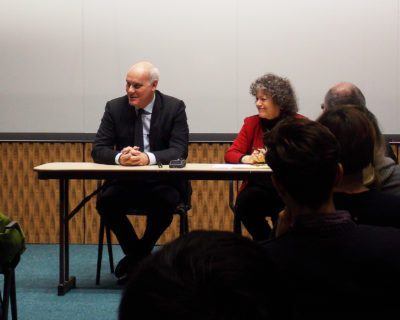
European Union ambassador to the United Nations João Vale de Almeida spoke about political issues regarding multiculturalism and diplomacy at Boston University’s Rajen Kilachand Center for Integrated Life Sciences and Engineering Thursday evening.
The talk, “After the (Political) Earthquakes: the EU, Multilateralism and a Volatile World,” was organized by Cathie Jo Martin, a political science professor, and Elizabeth Amrien, the assistant director of the Center for the Study of Europe. Moderated by international relations professor Vivien Schmidt, the conversation drew approximately 60 listeners.
After the conversation, Amrien said Vale de Almeida’s perspective was valuable to students because of how relevant Europe is in the global political climate.
“I think that it’s important for a number of reasons, just because of the sheer importance of Europe in the world today,” Amrien said. “It’s also important because of the transatlantic relationship, which is really sort of vital.”
Throughout the conversation, Vale de Almeida spoke about the importance of global diplomats and the role they play in global occurrences.
“When two leaders don’t get along, it’s more likely that problems will arise,” Vale de Almeida said. “Our job is to assure that as diplomats, [nations] have the best possible relations — today I need something from you, but tomorrow you will need something from me.”
Vale de Almeida also addressed current diplomatic issues facing the UN, such as the UN Security Council’s regulation of North Korea. He said he thinks the council must be cooperative in executing diplomatic solutions in order to solve the problem of North Korean nuclear power.
“Our first purpose would be to have the Security Council totally aligned in putting pressure, economic sanctions and political sanctions on North Korea and making sure these sanctions are abided by the whole international community,” Vale de Almeida said. “We don’t think the use of force will solve the problem; we think it will cause more problems.”
Vale de Almeida said the purpose of the EU is to create peace and joint action between countries.
“It’s about solving our problems through cooperation and not through war,” Vale de Almeida said. “It’s the idea that the economy can bring people together. If you merge economies, if you merge markets, if you create economic independence in countries, you create a foundation for political cooperation.”
Several BU students who listened to the conversation said they found the discussion by Vale de Almeida important because of its relevance, given the current international political climate.
College of Arts and Sciences senior Paola Garcia Joliet, said being half-Belgian, she is particularly interested in topics relating to the EU.
“I think [Vale de Almeida] is an especially important person because he’s been the ambassador in the U.S. and now he’s the ambassador of the EU in the UN,” Garcia Joliet said. “I just thought this was a really great opportunity to ask questions about the EU.”
Garcia Joliet said she also enjoyed hearing Vale de Almeida’s positive perspective on current global diplomacy and the EU.
“I really liked his outlook on Europe right now, especially how positive he was about everything,” Garcia Joliet said. “I also think he brought up a good point about [how] what’s happening with Trump is actually strengthening the EU.”
CAS senior Melissa Holihan said what interested her most was Vale de Almeida’s discussion of intelligence within the EU.
“I thought the question about intelligence was really interesting, because that’s been a hot-button issue lately,” Holihan said. “[It is interesting] how we’re working on improving the intelligence-sharing, and not just in the EU, but [also] with the U.S. and other countries, especially as terrorism is a global threat.”
CAS junior Hallie Coyne said she thinks exposure to topics of diplomacy and the UN is important for BU students in their efforts to understand global issues of the future.
“Right now, I don’t necessarily think as an undergrad I’d be in a position to necessarily act on any of the information,” Coyne said. “But I think having access to how people are thinking about the issues is a really good perspective to have early on.”




